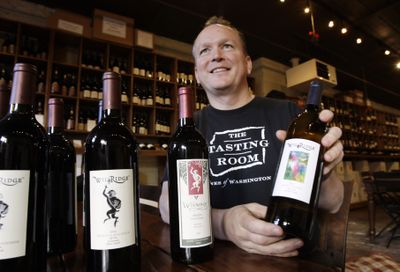Poring over beer, wine laws
Industry groups press lawmakers to review post-Prohibition regulations

YAKIMA – Paul Beveridge envisions a free market for beer and wine.
He acknowledges he’s biased as the owner of a small winery. But he says Washington’s post-Prohibition regulations offer too many protections for large wineries and breweries, not to mention distributors and retailers, artificially boosting prices for consumers.
Not surprisingly, others in the beer and wine industry disagree. The friction marks a split in the state’s booming wine industry, now boasting some 600 wineries. But the issues go far beyond wine, with everyone from grocery stores to small brewers working to negotiate some compromises in the past year and lawmakers likely to settle the differences.
Since Prohibition was repealed, Washington has had a three-tiered system for distributing beer and wine. Breweries and wineries sell to wholesalers at a minimum markup of 10 percent, and wholesalers sell to retailers, again at a minimum markup of 10 percent. Parties in one tier have generally been barred from having a stake in another.
Quantity discounts are banned, as is buying on credit and central warehousing of products. Merchandising and advertising to retailers is limited.
Some argue the laws are archaic and need to be changed, said Rick Garza, deputy director of the state Liquor Control Board.
“The reality is those laws are set there to create a level playing field,” he said. “And those pricing regulations are there to raise the price of alcohol to deter people from consuming too much alcohol.”
The state’s laws have been changed piecemeal over the years.
In 2004, Costco Wholesale Corp. sued the state, arguing that the many rules blocked the company from using its vast buying power to make beer and wine cheaper for Washington customers. An appeals court upheld most of the rules.
However, that decision – and the numerous bills brought before the Legislature each year – sparked a review of the state’s beer and wine laws by a committee of lawmakers. They already have created exceptions to the law banning ownership in more than one tier of the system. Wineries and breweries may now sell from their tasting rooms and open restaurants, but industry groups agree that more changes to that rule could be on the horizon.
“The three-tier system is still important and the tiers need to be independent, but you can protect the independence of that without barring ownership,” said John Guadnola, executive director of the Washington Beer and Wine Wholesalers Association, which supports a proposal to allow ownership in more than one tier.
The group’s roughly 50 members distribute 95 percent of beer and wine sold in Washington.
Industry leaders also agreed to a proposal to reduce or eliminate the minimum 10 percent markup.
Other businesses and groups are likely to bring forward proposals of their own.
Online retailer wine.com proposed allowing out-of-state online retailers to sell beer and wine directly to Washington consumers. The state already allows out-of-state shipments by wineries to in-state consumers.
Beveridge is pushing what he calls a “wine law modernization act.”
“All the police powers, all the public safety protections need to stay, but every other protection needs to go,” he said.
If he can’t win on that, Beveridge is pushing for relaxation of rules for wineries that produce 250,000 gallons or less annually.